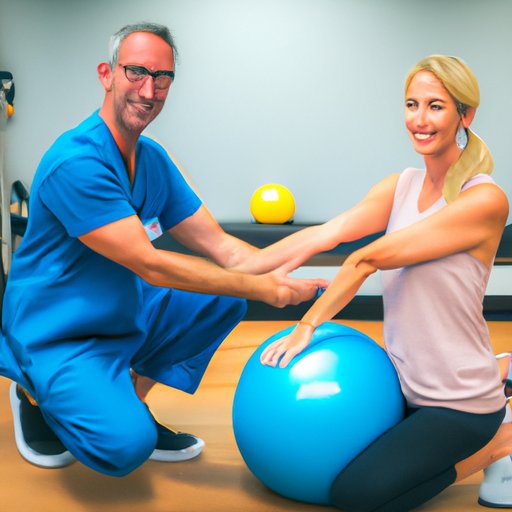
Introduction
Are you curious about the role and responsibilities of an exercise physiologist? This article will provide you with an in-depth exploration of what exercise physiologists do, how they work with clients to improve their health and wellness, and some of the latest trends and innovations in the field.

The Anatomy of Exercise Physiology: A Look Into the Role and Responsibilities of an Exercise Physiologist
Exercise physiologists play a critical role in promoting health and wellness. They focus on the science of exercise, exploring how the body responds to physical activity and how to design effective fitness programs. An exercise physiologist’s work can range from working with professional athletes to helping individuals with chronic conditions improve their health.
An exercise physiologist’s responsibilities can include evaluating individuals’ fitness levels, designing customized fitness plans that take into account their goals and medical history, and monitoring their progress. They work with individuals of different ages and abilities, from people who want to lose weight to those with chronic conditions like heart disease, diabetes, and arthritis.
From Fitness Goals to Chronic Conditions: How Exercise Physiologists Help Improve Health Outcomes
An exercise physiologist can help individuals improve their health by providing personalized fitness plans that consider their specific limitations and goals. They can help individuals with chronic conditions increase their stamina, strength, and flexibility, reducing their reliance on medication and improving their overall quality of life. Research shows that exercise can help reduce the risk of chronic disease and improve the prognosis for individuals who already have a chronic condition.
Exercise physiologists can work with individuals of all ages, tailoring their routines to meet their clients’ needs and abilities. Whether an individual is looking to improve their fitness level, manage a chronic condition, or prevent health problems in the future, an exercise physiologist can create a customized plan that helps them achieve their goals.
Unpacking Exercise Physiology: The Science and Art Behind Designing Effective Fitness Programs
Designing effective fitness programs requires a blend of science and art. Exercise physiologists rely on scientific methods to measure the body’s response to physical activity and design programs that suit each individual’s goals and abilities. They use different techniques to assess fitness levels, including measuring cardiorespiratory function, assessing body composition, and evaluating strength and flexibility.
Exercise physiologists must also have a deep understanding of the art of creating effective fitness plans. They understand that plans must be enjoyable, achievable, and tailored to the individual’s personality and preferences. They also understand that fitness plans must be regularly reviewed and updated to ensure that their clients continue to make progress toward their goals.
Exercise Physiology: An Essential Piece in Maximizing Athletic Performance
Exercise physiologists provide valuable guidance and support to athletes at all levels. They help athletes improve their performance by creating training programs that meet their specific needs and goals. This can include designing plans that focus on building endurance, strength, or agility.
Athletic performance can be improved by optimizing training programs based on an athlete’s individual needs. Exercise physiologists also advise athletes on nutrition, injury prevention, and rest and recovery. Their expertise helps athletes maximize their potential and prevent injuries that can sideline them.
The Evolving Field of Exercise Physiology: Trends and Innovations in Promoting Health and Wellness
The field of exercise physiology is evolving rapidly, fueled by advances in technology. Wearable technology and health apps have made it easier than ever before to track fitness levels and monitor progress. Exercise physiologists are also exploring new techniques, such as High-Intensity Interval Training (HIIT), to create effective fitness programs.
There’s also a growing emphasis on the importance of mental health and wellness in the field of exercise physiology. Exercise physiologists are beginning to explore the connection between physical and mental well-being, and how different types of physical activity can benefit individuals’ mental health.
In conversation with an Exercise Physiologist: Insights from the Frontlines of Fitness and Healthcare
To provide insight into the work of an exercise physiologist, we interviewed a practicing exercise physiologist. They explained that their work involves assessing clients’ fitness levels and creating programs that include both strength and aerobic training. They stressed the importance of individualizing plans to meet clients’ specific goals and preferences, and also emphasized the importance of communication and motivation when working with clients.
Our interviewee also shared their perspective on the future of exercise physiology. They predict that advances in technology will continue to shape the field and make it easier for individuals to monitor their fitness levels and progress. They also highlighted the growing emphasis on mental wellness and how exercise physiologists will play an important role in promoting both physical and mental health in the years to come.
Conclusion
Exercise physiology is a vital field that play a crucial role in promoting health and wellness. Exercise physiologists work with individuals of all ages and abilities, from high-performing athletes to individuals with chronic conditions. They bring scientific rigor and artistic flair to their work, designing customized fitness plans that help individuals achieve their goals. The evolving field of exercise physiology is full of exciting trends and innovations that will continue to shape the field for years to come. Contact a licensed exercise physiologist today to learn more about how they can help you achieve your fitness and health goals.





